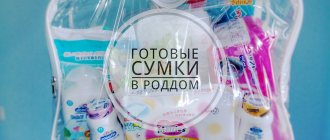Will I be able to breastfeed my baby?
Any woman who has breasts can breastfeed. All women who give birth have colostrum; it is already there at the end of pregnancy. There will definitely be a rush, regardless of the outcome of the birth, this process occurs automatically, but it happens at different times. A woman “dairy” and “non-dairy”, young and “not so young” can breastfeed, even “twins” and “triplets” can be fed, and even a woman who has adopted a child can breastfeed him!
In order for breastfeeding to be successful, a woman, first of all, needs desire! In addition, we need the support of others and training in maternal skills - how to attach the baby to the breast, how to feed in a comfortable position, how to swaddle, how to carry in your arms, so that it is comfortable for both the baby and the mother. Nature, when creating the process of breastfeeding, did everything so that this process was as convenient, comfortable and safe as possible. Cases of complete inability to breastfeed have not yet been encountered in the long-term practice of breastfeeding specialists.
What to feed your baby: formula or breast milk?
To begin with, let us recall that supplementary feeding
is the introduction of milk nutrition (milk formula) in addition to mother's milk.
(The introduction of new dishes into the baby’s diet: vegetable puree, porridge, cottage cheese is called complementary feeding,
and juices and fruit puree that do not replace feeding are called
vitamin supplements).
Thus, supplementary feeding is prescribed if the child for some reason does not receive enough breast milk. This is likely if the mother or baby is in serious condition. For example, if during childbirth or a cesarean section there were any complications with the mother’s health (bleeding, an attack of eclampsia - convulsions that arose as a manifestation of a complication of the second half of pregnancy - gestosis) and the woman is forced to stay in the intensive care ward for a long time, where To treat it, medications are used that do not allow the baby to be fed expressed milk (however, the mother expresses the milk with her hands or with a breast pump in order to preserve the possibility of natural feeding in the future).
The reason for a complete switch to formula milk may be infectious diseases, the pathogens of which can enter the baby’s body with the mother’s milk, for example, HIV infection or the detection of staphylococcus in milk. Supplementary feeding is most often required in severe conditions of the child, in which immediately after birth he is transferred to a specialized department of the children's clinic, while the mother is in the maternity hospital at this time and there is no technical ability to deliver breast milk to the baby. Most often, the need for supplementary feeding is caused by reduced milk production (hypogalactia). If there is a need for additional feeding, and the baby has any health problems, then there is considerable scope for selecting a medicinal mixture in order to correct these disorders. First of all, this way you can help children with low birth weight (formulas are prescribed for premature and low birth weight babies), as well as with functional and some organic problems of the gastrointestinal tract.
Thus, the strengths of supplementary feeding are the provision of sufficient nutrition to the baby and the possibility of correcting certain pathological conditions through the introduction of medicinal mixtures. No one questions the need for additional nutrition if, for example, the baby, for some reason, cannot be attached to the breast. This occurs due to birth injuries, prematurity, hemolytic disease of the newborn (a disease in which the fetus's Rh-positive red blood cells are destroyed by antibodies produced in the body of the Rh-negative mother) or any other ailment when it is placed in a special incubator or a system is connected to it intravenous infusion. After all, in the first 2-3 days the mother’s milk has not yet come, and it is impossible to express colostrum. About the same thing happens if the baby cannot be attached to the breast due to the mother’s condition (for example, while she is in the intensive care unit after a cesarean section). But, unfortunately, in maternity hospitals, babies are supplemented much more often than medical indications require. In addition to them, there is also a “specific” reason for supplementary feeding of children: not all institutions have conditions for mother and baby to stay together and, accordingly, the possibility of feeding on demand. Where children are forced to stay separately, they are supplemented with formula in accordance with the regimen. But it’s even more offensive when the reason lies not so much in objective conditions, but in the mentality of the medical staff. How many times have they told the world about the need to support natural feeding (which includes, first of all, the refusal to supplement and supplement feeding), but to this day, even in the most qualified and prestigious obstetric institutions, no, no, and you will hear the phrase: “How can do you want to keep the child with you? Your milk hasn't arrived yet! Do you want him to lose weight?!!” You might even think that weight loss for a baby is not an inevitable process when changing from intrauterine to extrauterine existence, but something unnatural and scary. Meanwhile, weight loss is physiological, that is, it should be normal. However, before the milk comes in, the baby has enough colostrum - the need for supplementary feeding can only be discussed in cases where the baby’s urine output decreases and the number of urinations sharply decreases. In the first three days, only 2 urinations are enough, from the third to the sixth - 4, starting from the sixth there should be at least 6 urinations per day. These are the lower limits. There may be more of them, but, according to WHO, until the 10th day of life, a baby can safely exist without supplementary feeding if such standards are observed and regardless of weight loss (we are talking about a full-term baby). When breastfeeding, there is no need for supplemental feeding: the baby drinks the offered water when he is hot (hot nose, reddish color of the skin). At the same time, the child loses a lot of fluid, so he drinks with pleasure. In such a situation, it is preferable to take off one vest rather than offer the child water from a pacifier.
However, they still suggest “feeding” the baby with formula after breastfeeding so that he “gets full.” And they helpfully leave ready-made bottles near the wards or children's departments. Meanwhile, supplementary feeding is fraught with a lot of pitfalls.
And the first among them, as already mentioned, is insufficient stimulation of lactation. A baby who is full from the formula will suck on his mother’s breast much less often and less actively, and therefore will be less likely to cause further milk production. Moreover, some “sissies” may immediately prefer a bottle to the breast due to the ease of sucking. This is of particular importance in the first days of a baby’s life, because it is then that he most easily gets used to both good and bad.
In addition, any formula is a foreign product and contains components unusual for mother’s milk, which are more “difficult” to digest. Therefore, the introduced mixtures cause greater stress in the functioning of the digestive glands. In adulthood, children exposed to formula early are more at risk of gastrointestinal diseases. If the proportion of the resulting formula is large compared to the intake of breast milk, this can cause improper colonization of the gastrointestinal tract with representatives of microflora and leads to dysbiosis. It is especially dangerous in this sense if the mixture is the first to reach the baby’s stomach and intestines. It is extremely important to put your baby to the breast whenever possible in the delivery room. The first drops of colostrum will ensure proper colonization of the gastrointestinal tract with beneficial microbes.
Of course, supplementary feeding may be necessary for the baby. It just needs to be thoughtful. In all cases, the least of many evils must be chosen.
While there is no milk, does the baby need supplemental feeding with formula?
During the entire existence of man as a mammal, supplementary feeding of newborns with formula until the mother's milk came in began relatively recently, since the invention of milk substitutes. From the same time, artificial feeding began. Before this, for hundreds of thousands of years, children were fed colostrum, and no one had any desire to give the newborn something else. The need for formula supplementation in modern Russian maternity hospitals, unfortunately, is greatly exaggerated. In reality, a newborn baby is only designed for colostrum alone. A little bit of it is produced - a drop, and that's enough for the baby! Immature kidneys are not yet able to process large volumes of liquid; they start working together with the flow of milk from the mother. Nature is wise!
What to do?
There are situations when it is objectively impossible to do without supplementary feeding with formula ( they are listed HERE ). You need to understand that the mixture in this case acts as a lesser evil - it is worse not to give the mixture than to give the mixture . But if the mother has a choice whether to give formula or not, it is better not to give it . Let us remind you that in terms of the degree of preference for supplementary feeding for infants, the order is as follows: breastfeeding the child from his own mother; feeding your own mother's expressed milk; feeding another woman or another woman's expressed milk; and only after it is impossible to implement any of these options should the choice of mixture be made. If you feel like you don’t have enough milk, or are just wondering if you need to give formula in some difficult situation, contact a natural feeding consultant, they will help you assess the situation, weigh the risks and establish breastfeeding!
See also: Irina Ryukhova’s webinar “Introduction to motherhood” Irina Ryukhova’s webinar series “Breastfeeding. Basics"Webinar by Irina Ryukhova "Feeding a growing baby from 6 to 12 months" Webinar by Irina Ryukhova "Feeding after a year"
The material is presented by the project “New Level. Advanced training for breastfeeding consultants"
What intervals should be maintained between applications?
Before the milk comes in, in the first 2-3 days, the baby sucks without a pronounced rhythm, but the demands can be frequent - after 20-40 minutes of the previous sucking, or rare - several times a day. There is no need to maintain any special time intervals. After the milk comes in, the baby begins to suckle frequently, on average every hour during the day, and at least 3 times at night. This is a normal baby's suckling rhythm, no need to worry. If the baby rarely sucks and sleeps a lot, then the mother herself should offer the breast to the sleepy baby. Babies suckle wonderfully in their sleep.
Feeding a newborn after a caesarean section
Question: Now in maternity hospitals it is practiced to feed the baby formula in the first days after a caesarean section. And only when the mother’s milk comes in do they switch to breastfeeding. Is it correct?
Answer: In all perinatal orders, protocols for the child, for childbirth, for cesarean, which were adopted many years ago, exclusive breastfeeding is prescribed, both in the case of vaginal birth and after cesarean. It is quite possible for a baby born by caesarean section to be exclusively breastfed in the maternity hospital. As a rule, during a cesarean section I use local anesthesia, and after the baby is born, it is placed on the mother’s chest, in a “skin to skin” thermal chain during the operation. If the child is ready, then there are cases when he finds the breast and begins to suckle during the operation. But more often, attachment occurs in the intensive care unit. The baby should not be fed formula even if the mother gave birth to the baby using general anesthesia.
My milk has arrived, do I need to express it?
If the baby is with you and you have the opportunity for frequent feedings, then there is no need to express. Most often, a little more milk immediately comes in than the baby needs, but within a day the situation is normalized by frequent sucking, and the next day the milk comes in exactly as much as the baby needs. What is the demand, so is the supply. Therefore, you cannot express during the day after the onset of the tide, otherwise there may be an even greater tide than the previous one. Pumping may be necessary if the baby does not suck (is separated from the mother) or sucks ineffectively and rarely.
Bag No. 2 – for mother after childbirth
- Mesh disposable panties (6 pcs.)
- Sanitary pads and breast pads
- Nursing bra
- Postpartum or postoperative bandage if a cesarean section is planned
- Towel and soft toilet paper
- Shampoo, soap, baby cream
- Toothbrush and toothpaste
- Comb and soft hair elastic
- Bag for dirty laundry
You are often not allowed to bring your own dishes, robe and nightgown. They are given out at the maternity hospital. This point needs to be clarified further in the maternity hospital you are going to.
The child is with me, often suckles, but constantly cries. He's probably hungry!?
After birth, children do not cry from hunger! They experience childbirth and the postpartum period many times. If during childbirth and in the first days after birth something went beyond the physiological norm, there were interventions in childbirth, stimulation of labor, anesthesia; after birth, the baby suckled little (less than 1 hour) or did not suck at all; then he was taken away from his mother, fed with formula or water, etc., then there are many “reasons” for crying!
Experienced lactation consultants say: “A baby doesn’t always sleep full, and doesn’t always cry hungry.” A bottle of formula will not change the experience after childbirth, but it can change the type of feeding and lead to the baby refusing to breastfeed.
What to take with you to the hospital
You will most likely be allowed to take only the essentials directly to the maternity ward. They can bring you everything else later.
- Still water (2 bottles, 0.75 l)
- Rubber slippers (if your husband will be present at the birth, he will also need slippers)
- Mobile phone with charger
- Soft paper napkins
- Anti-varicose stockings (if there is evidence from a phlebologist)











